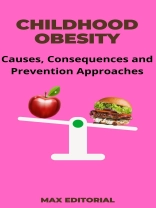Childhood obesity is a growing public health problem involving excessive accumulation of body fat in children and adolescents. This condition is one of the most pressing concerns today, given its substantial impact on the health and well-being of younger generations. This chapter will discuss the definition and prevalence of childhood obesity, as well as highlight the importance of the topic in the context of public health.
Definition and Prevalence of Childhood Obesity
Childhood obesity is characterized by excess body weight that is associated with health risks. It is often assessed using the body mass index (BMI), which takes into account the relationship between weight and height. When the BMI of a child or adolescent is above the established limits for their age group, they are considered obese. However, it is worth mentioning that childhood obesity is not just an aesthetic problem, but a health issue that is closely linked to a number of medical conditions, such as type 2 diabetes, hypertension, cardiovascular diseases and musculoskeletal disorders.
The prevalence of childhood obesity has increased dramatically in recent decades. It has become a global phenomenon, affecting both developed and developing countries. The transition from less healthy eating patterns, combined with a sedentary lifestyle and constant exposure to ultra-processed foods , contributed to the spread of this problem. Childhood obesity rates vary by region and population, but in many places, the numbers are alarming and indicate a public health crisis.
Importance of the Topic and Its Relevance to Public Health
Childhood obesity should not be underestimated as its implications go far beyond individual health concerns. It has a profound impact on communities, health systems and the broader economy. Obese children are at greater risk of becoming obese adults , increasing the chances of developing debilitating and costly chronic diseases. This puts a significant strain on healthcare systems, consuming valuable resources that could be allocated elsewhere.
In addition, childhood obesity also influences social and emotional issues. Obese children often face discrimination, bullying and low self-esteem , which can hinder their psychosocial development. This can have lasting effects throughout life, affecting quality of life and productive participation in society.
In light of these challenges, addressing childhood obesity has become a global priority. The need for effective preventive interventions, nutritional education programs, promotion of physical activity and changes in public policies is crucial to reverse this worrying trend. This book will explore these issues in detail, providing insights into the underlying causes, consequences , and multidisciplinary approaches that can be taken to tackle the childhood obesity epidemic comprehensively and effectively.
关于作者
Passionate about knowledge and encouraging maximum human potential, we dedicate ourselves to unlocking the secrets of success and productivity. Through words, we guide people on a journey of learning and transformation, helping them to achieve their goals and a more fulfilling life.
With clear and accessible language, we make complex concepts understandable to everyone, democratizing access to knowledge and inspiring positive changes in people’s lives, both personally and professionally. We seek to combine theory with practical applications, offering effective tools and strategies for overcoming challenges, increasing productivity and making dreams come true.
We believe in knowledge as the main key to success. Enabling everyone to have the potential to achieve great things.
Our materials are a source of inspiration and motivation for anyone looking to develop their skills, learn new things and realize their full potential.
If you’re looking for books that inspire you to go further, teach you to be more productive and help you achieve your objectives, goals and dreams, then these books are for you.
Get ready to transform your life!












